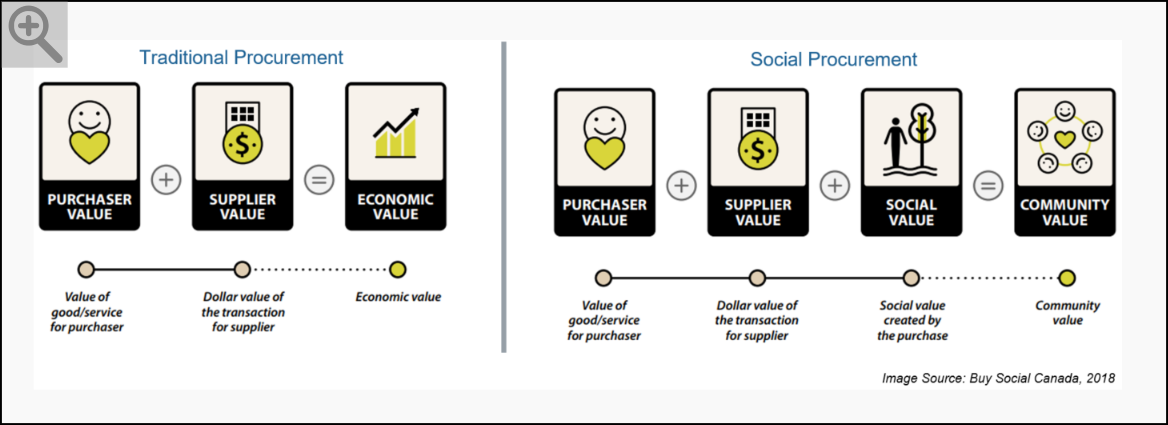Social Procurement
Every purchase has a social, economic, cultural, and environmental impact.
Through Social Procurement, U of T can leverage existing procurement activities to achieve positive social value outcomes to:
- Foster an inclusive economy, reduce poverty, and create employment opportunities
- Support local businesses and stimulate local economy
- Energize arts, heritage, and culture initiatives
- Enhance the cultural vibrancy of our campus and community
- Prioritize inclusion and diversity in the supply chain
How does Social Procurement work:
Social procurement is about providing typically underrepresented suppliers who may not be aware of, or approached, for potential business opportunities.
Finding these suppliers is easy and a regularly updated list is available through the Diverse Supplier Portal, a directory of social enterprises, diverse/equity-deserving, and local suppliers.
For instructions on how to use the portal, visit the Information Library.
Procurement Policy Requirements
All suppliers (whether diverse or not) should be provided with an equal opportunity to do business with U of T and meet the specifications of a quotation request including competitive pricing.
Purchases from diverse suppliers are subject to the University’s Procurement Policy, which includes obtaining the minimum number of quotations based on dollar thresholds:
| Under $10,000 | $10,000 – $50,000 | $50,000 – $100,000 | $100,000+ |
|
1 Quote Source directly without obtaining additional quotations |
2 Quotes Invite to quote at least one diverse supplier |
3 Quotes Invite to quote at least one diverse supplier |
Open tender Phase 2 |
Frequently Asked Questions
| Collapse All
Social vs traditional procurement?
What is a Diverse Supplier?
- Social Enterprises – businesses that sell goods and services in the marketplace, with a social, environmental, or cultural mission, which they reinvest the majority of their profits back into.
- Diverse/Equity-Deserving Suppliers – businesses at least 51% owned, managed and controlled by an equity-deserving community, such as Black, Indigenous Peoples (First Nations, Inuit and Métis), Persons of Colour, 2SLGBTQIA+, Women, Persons with Disabilities, Youths, Seniors, and New Canadians.
- Local Suppliers – small businesses in communities that can be supported to grow and increase their capacity, creating a ripple effect in the local economy that can increase local wealth and jobs.
Are Diverse Suppliers required to be setup in FIS
To initiate the process, please complete the New Supplier Account Request form and ensure to mark the Diverse Supplier checkbox.

How can my company register as a Diverse Supplier?
What is an Equity-seeking community?
Do social procurement programs increase costs?
Social procurement is not an additional cost but an innovative adaptation of existing procurement procedures with broader objectives. Goods and services are still competitively and transparently procured, with added value coming from the inclusion of social impact criteria in bid evaluations. Social procurement can seamlessly integrate into major development projects, including infrastructure.
